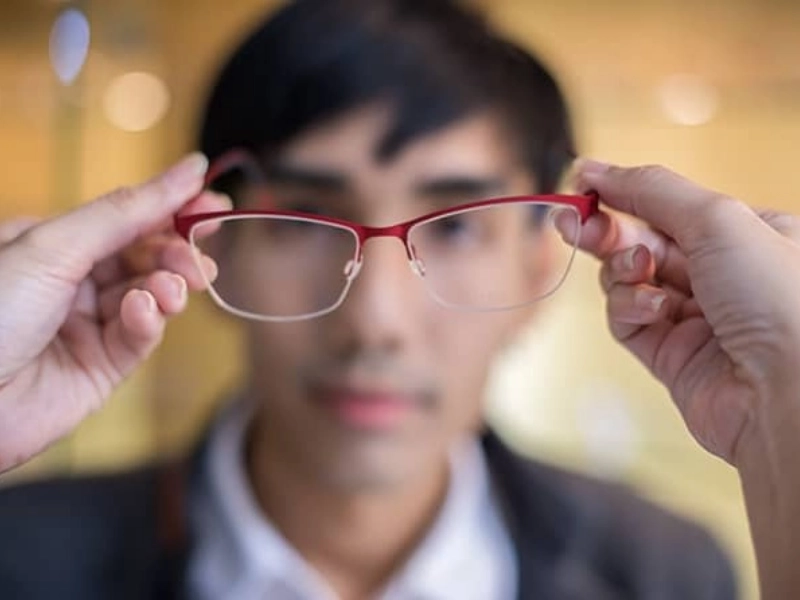Some people worry that continuing to wear glasses will worsen their vision. It depends on the degree of hyperopia and whether the lenses are progressive or bifocal. Several recent studies have shown that wearing the right prescription can reduce the progression of myopia, but a thorough eye exam is still needed to get the best results.

 It is often thought that wearing glasses will make your eyesight worse. However, this is completely wrong. Glasses help improve your eyesight by changing the way light enters the eye. For example, farsightedness can be helped by glasses with positive focus (added lenses) that can bend the light onto the retina, while myopia can be helped by glasses with negative focus lenses, with negative focus being the opposite. Importantly, glasses can be taken off at any time and will not change your eyesight forever. Looking sideways at something up close often leads to headaches and eye strain, which can be alleviated by wearing glasses. For those with myopia problems, presbyopia is a good choice, especially if you are over 40 years old. If you are having problems with your eyesight, talk to your eye doctor. They will be happy to offer advice on various alternatives for eye care. Depending on your needs and situation, they may recommend refractive surgery or wearing contact lenses.
It is often thought that wearing glasses will make your eyesight worse. However, this is completely wrong. Glasses help improve your eyesight by changing the way light enters the eye. For example, farsightedness can be helped by glasses with positive focus (added lenses) that can bend the light onto the retina, while myopia can be helped by glasses with negative focus lenses, with negative focus being the opposite. Importantly, glasses can be taken off at any time and will not change your eyesight forever. Looking sideways at something up close often leads to headaches and eye strain, which can be alleviated by wearing glasses. For those with myopia problems, presbyopia is a good choice, especially if you are over 40 years old. If you are having problems with your eyesight, talk to your eye doctor. They will be happy to offer advice on various alternatives for eye care. Depending on your needs and situation, they may recommend refractive surgery or wearing contact lenses.
 There is no evidence that continued wearing of glasses impairs vision--on the contrary. Wearing glasses can correct refractive defects in the eye and improve the ability to see far away. When a person is farsighted, distant objects appear clear, while close objects appear blurry. Using glasses is the most common method of correction. Mild myopia is common when children are born, but this situation may change as they get older. However, as we age, our eyes lose flexibility and we are unable to focus on close objects, which can become a maturation issue. We call it presbyopia. In this case, two optical glasses or progressive lenses are needed to provide a certain range of vision. For optimal effect, glasses must be worn as prescribed. Ideally, they should be worn all the time. If you have any questions about how to care for your glasses, consult your doctor. They can perform a full examination and provide you with advice on how to wear your glasses correctly.
There is no evidence that continued wearing of glasses impairs vision--on the contrary. Wearing glasses can correct refractive defects in the eye and improve the ability to see far away. When a person is farsighted, distant objects appear clear, while close objects appear blurry. Using glasses is the most common method of correction. Mild myopia is common when children are born, but this situation may change as they get older. However, as we age, our eyes lose flexibility and we are unable to focus on close objects, which can become a maturation issue. We call it presbyopia. In this case, two optical glasses or progressive lenses are needed to provide a certain range of vision. For optimal effect, glasses must be worn as prescribed. Ideally, they should be worn all the time. If you have any questions about how to care for your glasses, consult your doctor. They can perform a full examination and provide you with advice on how to wear your glasses correctly.
 Each person's way of life and unique refraction will determine whether or not they need to continue wearing glasses. However, if your prescription is below the legal driving limit or you have a low myopia rate, it is usually safe to wear them for most tasks and will not cause any injury. Some people with moderate myopia find that they must continue wearing glasses because their vision is not good enough to complete close-up tasks such as reading or using a smartphone without squinting. These people can also correct their myopia or hyperopia by replacing them with zoom or bifocal lenses. Similar to this , myopia makes it harder for your eyes to focus, which is why squinting is needed. Eyeglasses and laser eye surgery can help improve this situation by changing the way light enters the eye or modifying the cornea to focus properly on the retina.
Each person's way of life and unique refraction will determine whether or not they need to continue wearing glasses. However, if your prescription is below the legal driving limit or you have a low myopia rate, it is usually safe to wear them for most tasks and will not cause any injury. Some people with moderate myopia find that they must continue wearing glasses because their vision is not good enough to complete close-up tasks such as reading or using a smartphone without squinting. These people can also correct their myopia or hyperopia by replacing them with zoom or bifocal lenses. Similar to this , myopia makes it harder for your eyes to focus, which is why squinting is needed. Eyeglasses and laser eye surgery can help improve this situation by changing the way light enters the eye or modifying the cornea to focus properly on the retina.